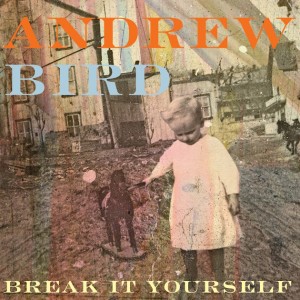 Andrew Bird has always flirted with the idea of making pop music. His often sprawling, always impressively constructed compositions have toyed with the boundaries between experimentation and melodic straightforwardness for years now, but his strength has always lain in being able to engage the listener but not compromise on his own sound. On Break It Yourself, his sixth solo album, he seems to have chosen to step off that line, and taken a side. This is as close to pop as Andrew Bird is ever likely to get, and he’s all the better for it.
Andrew Bird has always flirted with the idea of making pop music. His often sprawling, always impressively constructed compositions have toyed with the boundaries between experimentation and melodic straightforwardness for years now, but his strength has always lain in being able to engage the listener but not compromise on his own sound. On Break It Yourself, his sixth solo album, he seems to have chosen to step off that line, and taken a side. This is as close to pop as Andrew Bird is ever likely to get, and he’s all the better for it.
Lead single, ‘Eyeoneye’ is the most extreme example, but a perfect one at that. A burst of Shins-indebted classic pop-rock, eminently catchy, distinctly punchier than we’re used to but still rooted in Birdsian traditions – the boundless vocabulary presented in his lyrics (“go ahead and re-ionise yourself”), structural ideas beyond the usual verse-chorus-middle eight and, of course, the life-threateningly brilliant whistling that’s become the hallmark of every Bird record. If you did come into this album with expectations based on the single alone, you’d find yourself deceived, but it’s certainly not a false indication of what’s contained in Break It Yourself.
The easiest way to think this record through is as a balloon, struggling to take off into airier, freer climes, but anchored by the weight of pop’s conventions. Opener ‘Desperation Breeds’ begins with a gently rolling guitar, which gives way to another Bird trademark, pizzicato violin, which then underpins violin sweeps, each growing in volume as the song continues. It’s a classic buildup, the sort of thing stadium rock bands use to pretend to be emotional, but deconstructed and placed within the confines of Bird’s style. ‘Orpheo Looks Back’ takes a different approach, harking back to Bird’s early affinity with British folk music, a running, tumbling fiddle part dominating most of the song but always returning to a central, whistle-accompanied refrain that acts as chorus. It’s breathless stuff, and perhaps the most vibrant and engaged a Bird song has sounded for years.
It’s that engagement that marks this album as different to its predecessors. When Bird gives up his usual lofty pronouncements to softly lament that “I can’t see the sense in us breaking up at all” amidst the gently thrumming soul of ‘Lazy Projector’, you can’t help but feel that this is a moment that’s imprinted itself on Bird himself, rather than the fanciful tales of “calcified arythmetists” and “proto-Sanskrit Minoans” from his last album. Similarly, the interplay with the recurring voice of St. Vincent’s Annie Clark, most notably on the accented dream-pop of ‘Lusitania’, doesn’t just give you the sense that Bird is making connections with other parts of the industry but, paradoxically, makes the songs more personal – that in hearing his conversation with others, we’re learning more about Bird than we ever have previously.
Of course, it can’t be all one way traffic, and by the final two tracks that metaphorical balloon is let loose to climb higher than we’ve seen it go before. ‘Hole In the Ocean Floor’ is an eight-minute windswept meander through expressionistic violin patterns and closer ‘Belles’ is a field recording-cum-ambient track that’s exactly as straightforward as that description makes it sound. It’s an odd way to end an album so steeped in recognisable styles, but perhaps a fitting one, an acknowledgement that what we’ve seen of Bird here is only telling part of the story, no matter how artfully it’s presented. Break It Yourself is just that, then, a well-considered presentation of Andrew Bird’s skill at mixing both his virtuoso talents and ear for melody, a perfect evolution for established fans and a welcome introduction for those interested in taking the plunge into a discography that could seem forbiddingly abstract at times. This is by no means the full picture, but it’s an incredibly appealing one, and certainly the best we’ve seen from him so far.

2 comments for “Album | Andrew Bird – Break It Yourself”